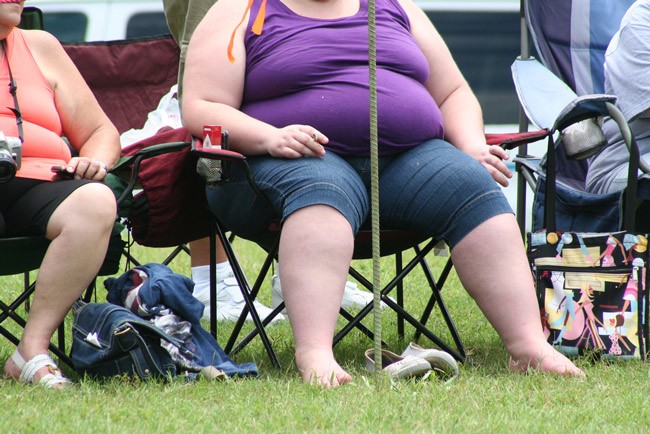
By Richard Dobbs and Boyd Swindburn
In 2010, humanity passed an important milestone. According to the Global Burden of Disease Study, published in the British medical journal The Lancet, obesity became a bigger public-health problem than hunger.
Today, according to the latest edition of the study, more than 2.1 billion people – nearly 30% of the global population – are overweight or obese. That is nearly two and a half times the number of adults and children who are undernourished. Obesity is responsible for about 5% of deaths worldwide.
This crisis is not just a pressing health concern; it is also a threat to the global economy. The total economic impact of obesity is about $2 trillion a year, or 2.8% of world GDP – roughly equivalent to the economic damage caused by smoking or armed violence, war, and terrorism, according to new research by the McKinsey Global Institute (MGI).
And the problem is likely to worsen. If the current trend continues, almost half of the world’s adult population will be overweight or obese by 2030. As World Health Organization (WHO) Director-General Margaret Chan has noted, “Not one single country has managed to turn around its obesity epidemic in all age groups.” According to the OECD, from 2000 to 2013, the prevalence of obesity increased by at least 0.5% per year in 130 of the 196 countries for which data were collected.
This global epidemic is not confined to advanced countries. As emerging economies climb out of poverty, their citizens are becoming fatter. More than 60% of the world’s obese people live in developing countries, where rapid industrialization and urbanization are boosting incomes and therefore calorie intake. In India and China, the prevalence of obesity in cities is 3-4 times the rate in rural areas.
Indeed, the evidence suggests that developing countries are especially vulnerable to the epidemic. Obesity rates tend to explode in countries where food was once scarce and suddenly becomes plentiful. In the mid-twentieth century, for example, a boom in phosphate mining transformed the Micronesian island state of Nauru from a land of food shortages and starvation to the world’s leader in obesity and type-2 diabetes. In 2005, according to the WHO, 94% of men and 93% of women in Nauru were overweight, and more than 70% of the population was obese.
To make matters worse, in countries with limited public-health services, the cost of health care falls directly on the afflicted households. As a result, obesity can lock in poverty and perpetuate inequality.
Through a review of 500 intervention trials around the world, MGI has identified 74 potential interventions that could be used to address obesity. These include subsidized school meals, urban design that encourages walking, better nutritional labeling, restrictions on the advertising of high-calorie food and drinks, and fiscal measures.
Education concerning the risks of obesity is important, as is taking personal responsibility for one’s health, fitness, and weight. But all the evidence shows that relying on knowledge about obesity and willpower is not enough to offset the evolutionary instinct to overeat. These effects are compounded by lifestyles that require little or no physical activity.
People need help, and that means changing the environmental forces shaping their decisions – by, say, reducing standard portion sizes, altering marketing practices, and designing cities and educational establishments to make it easier for people to exercise or be active.
MGI was able to collect enough data on 44 of the 74 potential interventions to develop an initial assessment of their impact if they were scaled up to a national level. If the United Kingdom, for example, were to deploy all 44 interventions, it could rein in obesity rates and help roughly 20% of its overweight and obese population return to a healthy weight within 5-10 years.
Over the long term, savings from reduced health-care spending and gains from higher productivity could outweigh the investment needed to deliver interventions. In the UK, reversing obesity trends could save the National Health Service about $1.2 billion a year.
For many countries, tackling obesity will require a national – if not global – effort. Only a coherent, sustained portfolio of initiatives, implemented on a large scale, will be effective. No single entity – government, retailers, consumer-goods companies, restaurants, employers, media organizations, educators, health-care providers, or individuals – can address obesity on its own.
We do not yet have all the answers when it comes to the best way to tackle obesity. But the rapid rise in obesity rates around the world creates a strong case for experimenting with interventions, to see what works. Today, investment in obesity research worldwide amounts to some $4 billion a year – just 0.2% of the estimated social costs of obesity. We can – and must – do more.
![]()































gmath55 says
Why walk when you can roll! You are fat because you eat to much. Stop going to McDonalds, Burger King, Wendys, etc.
What's Happening says
A lot of it is in our food–overprocessed, chemically-overripe and artificial garbage, artificially flavored to taste like the real thing. God only knows what’s in it, really, because we don’t have to label everything. And don’t even get me started on “artificial sweetners”–drink enough Diet Coke and you’ll want to keep eating until you drop dead, literally.
The food we serve in this country these days is evil. There is no other word for it. Ask yourself why half the world bans imported food from America. It’s not *just* about the lack of labels.
Sherry E says
Lots of info out there about harmful chemicals in the food in the USA. . . here’s just a taste (pun intended):
“Toxic food additives disturb the absorption of essential vitamins and minerals in the body, and so nutritional deficiencies can occur when a regular diet includes the intake of certain chemicals. Troubles such as obesity, binge eating, binge drinking and addiction, diabetes, depression and hyperactivity in children can all be triggered by the common chemical additives in processed food.
Food additives can affect the immune system. They can affect the delicate balance of bowel flora which includes things like acidophilus and candida, and this affects the immune system. Candida yeast infections can develop when the bowel flora is upset through chemicals. Exposure to areas which have been sprayed with toxic chemicals such as herbicides and pesticides can also upset the natural flora of the bowel, which leads so sickness. Degenerative conditions such as arthritis and cancer can be set off by regular ingestion of the many common additives put into packaged food.
Preservatives To Avoid: Some of the most harmful food additives are the preservative chemicals. These are the benzoates; the sulphates and sulphites; the nitrates and nitrites; the galates; and the antioxidants BHA and BHT.
Flavour Enhancers To Avoid: The glutamates are especially bad
Artificial Sweeteners: These are all bad. Saccharine, Aspartame, Sorbitol and other chemical sweeteners are all foreign to the body. Unless you are diabetic, it is better to use brown sugar, molasses, treacle, maple syrup or honey, than anything which has artificial sweetener in it. These other sugars are real foods which the body can digest. Artificial sweeteners are not foods, but are chemicals foreign to the body: Artificial sweeteners cause ill health.”
Lin says
Oh yeah obesity is a threat to my health
I have to force myself to look in the mirror, get my butt out of the chair, read food labels with calorie counts and additives, choose the right foods veggies over starches & sweets, take home 1/2 of restaurant meals, see my dr for checkups.
My responsibility don’t need 44 initiatives just will power. I know what to do.
Pierre says
If I don’t have a problem with it then no one should!!! It is their own darn fault!! They DESERVE what they get. No way someone close to me falls into that category and if they do screw them too!!!……………..
Right, you are all so perfect (in that regard, of course). Just batch them all into one group and point out how they make the world a worse place and how the rest of us in society need to change them to be more like us. Put them into this group and show the world how they just drag us all down with them. Fantastic, whats next?
Prometheus says
When “THEY” come back, it will be a smorgasbord for them. Aliens will invade us so fast once they see all the FAT people they can eat. ET don’t phone home !!!!
Aquaman says
Fact is that eating properly while avoiding overly processed foods is more costly and time-consuming.
Fresh vegetables and fruit are expensive. People who work hard have a hard time sticking to
home-cooked meals (especially breakfast and lunch). People who are poor (the majority) struggle to afford the better-for-you raw foods.
Read the article again. Have some compassion for others because you will eventually reap what you sow.
One day they’ll be snickering at you – the guy who hurt himself and can’t be active anymore, who is now FAT and joins the chorus of “it isn’t my fault.”
Flatsflyer says
Just go to WalMart and look at the people. They dress poorly, they’re fat, the hair is a mess, makeup is a thing of the past, education is non existent and tattoos cover every inch of skin. These people are our future and the future looks very dim.
Retired FF says
Hey, get up off the couch and take a walk everyday. Stop having kids sit in front of computer screens for hours on end playing games. Send them out to play. Stop eating pork rinds, potato chips, tons of junk food, etc. and start eating healthy. Nothing funnier to see some over weight person in a restaurant order the extra large fries and then ask for a diet Coke. Are you kidding me?
Lancer says
Is it a coincidence that the most “obese” state also has the greatest amount of people on SNAP?? Mississippi.
http://www.huffingtonpost.com/2014/03/05/obese-states-most-least_n_4896517.html
http://www.governing.com/gov-data/food-stamp-snap-benefits-enrollment-participation-totals-map.html
Nalla C. says
Yup–Mississippians are no doubt buying the cheapest food available with those SNAP cards. No organics for them, unless they want to starve for two weeks out of the month.
The cheap food is the worst food for a reason, and it’s not just about cost.
Buy Dbol says
Your body is programmed to survive. A starvation diet triggers protective actions. Your body fights to keep weight on. So while you will see changes, you are more likely to lose muscle mass.